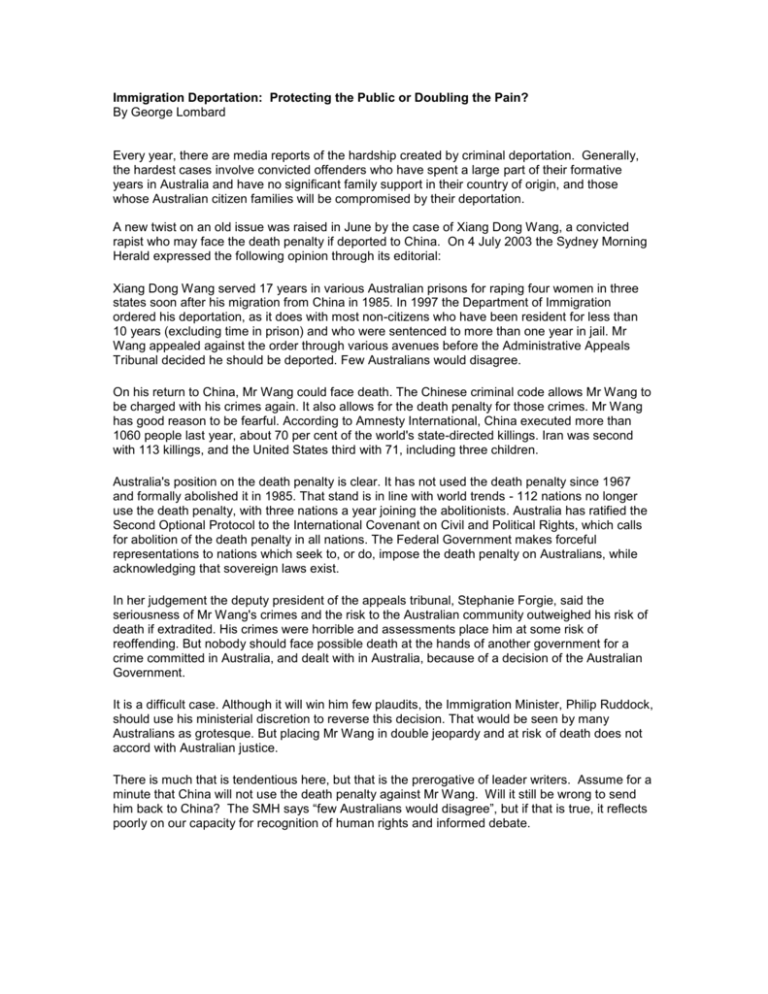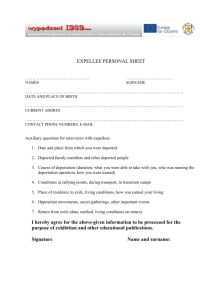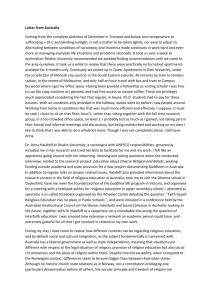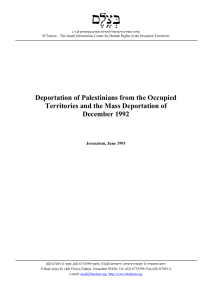printer friendy version
advertisement

Immigration Deportation: Protecting the Public or Doubling the Pain? By George Lombard Every year, there are media reports of the hardship created by criminal deportation. Generally, the hardest cases involve convicted offenders who have spent a large part of their formative years in Australia and have no significant family support in their country of origin, and those whose Australian citizen families will be compromised by their deportation. A new twist on an old issue was raised in June by the case of Xiang Dong Wang, a convicted rapist who may face the death penalty if deported to China. On 4 July 2003 the Sydney Morning Herald expressed the following opinion through its editorial: Xiang Dong Wang served 17 years in various Australian prisons for raping four women in three states soon after his migration from China in 1985. In 1997 the Department of Immigration ordered his deportation, as it does with most non-citizens who have been resident for less than 10 years (excluding time in prison) and who were sentenced to more than one year in jail. Mr Wang appealed against the order through various avenues before the Administrative Appeals Tribunal decided he should be deported. Few Australians would disagree. On his return to China, Mr Wang could face death. The Chinese criminal code allows Mr Wang to be charged with his crimes again. It also allows for the death penalty for those crimes. Mr Wang has good reason to be fearful. According to Amnesty International, China executed more than 1060 people last year, about 70 per cent of the world's state-directed killings. Iran was second with 113 killings, and the United States third with 71, including three children. Australia's position on the death penalty is clear. It has not used the death penalty since 1967 and formally abolished it in 1985. That stand is in line with world trends - 112 nations no longer use the death penalty, with three nations a year joining the abolitionists. Australia has ratified the Second Optional Protocol to the International Covenant on Civil and Political Rights, which calls for abolition of the death penalty in all nations. The Federal Government makes forceful representations to nations which seek to, or do, impose the death penalty on Australians, while acknowledging that sovereign laws exist. In her judgement the deputy president of the appeals tribunal, Stephanie Forgie, said the seriousness of Mr Wang's crimes and the risk to the Australian community outweighed his risk of death if extradited. His crimes were horrible and assessments place him at some risk of reoffending. But nobody should face possible death at the hands of another government for a crime committed in Australia, and dealt with in Australia, because of a decision of the Australian Government. It is a difficult case. Although it will win him few plaudits, the Immigration Minister, Philip Ruddock, should use his ministerial discretion to reverse this decision. That would be seen by many Australians as grotesque. But placing Mr Wang in double jeopardy and at risk of death does not accord with Australian justice. There is much that is tendentious here, but that is the prerogative of leader writers. Assume for a minute that China will not use the death penalty against Mr Wang. Will it still be wrong to send him back to China? The SMH says “few Australians would disagree”, but if that is true, it reflects poorly on our capacity for recognition of human rights and informed debate. A first consideration is that criminal deportation might be a breach of our obligations under the International Convention on Civil and Political Rights 1 if it were known that China would try Mr Wang again for the crimes committed in Australia. This would constitute a breach of the principle that no-one should be tried twice for the same offence. The terms used to name this principle are familiar. In the United States, it’s double jeopardy, in the British legal tradition it’s normally “autrefois convict” or “autrefois acquit”. And in Ancient Rome it was “res judicata” or “ne bis in idem”. A second consideration, and one not greatly aired in Australia with respect to criminal deportation, is that it may also be double jeopardy just to deport a person of foreign nationality who has been convicted of a crime. Currently a proposal is before the French legislature to restrict deportation of convicted criminals where the person concerned entered France before the age of 13 years, has lived in France for 20 years, or has lived in France for 10 years and was married to a French person for three years or is the parent of a French child2. The justification for this proposal is twofold: that a criminal conviction is one penalty, and deportation is another, in respect of the same crime; and that no penalty should be discriminatory on the basis of national origin. Deportation of criminals has a long history. The concept of banishment has a biblical pedigree, and philosophers and administrators have long believed that a country could deport foreigners, even refugees, who were a threat to the security of the country where they are. Writing in 1758, the Swiss philosopher Emerich de Vattel, in his celebrated “Law of Peoples or Principles of Natural Law”, acknowledged that foreigners who might “cause … disorder hurtful to the public welfare” could be sent off elsewhere.3 Equally, the framers of the United Nations Convention on Refugees permitted a country of refuge to deport a refugee “who, having been convicted by a Article 14(7) of the ICCPR reads “No one shall be liable to be tried or punished again for an offence for which he has already been finally convicted or acquitted in accordance with the law and penal procedure of each country” 2 See, eg, http://www.unepeinepointbarre.org/ , a website in French devoted to this issue. The preamble to the report of the French National Bar Council which was adopted by its national assembly on 27 and 28 June 2003 reads as follows: L’expression « double peine » vise le fait, pour un étranger résidant en France et ayant commis une infraction pénale sur le territoire français, de faire l’objet, non seulement d’une peine de prison ou d’amende, mais aussi d’une mesure d’éloignement constituée, soit par l’interdiction du territoire français, peine complémentaire prononcée par le juge pénal, soit par l’expulsion, mesure de police administrative prononcée par le ministre de l’Intérieur ou le préfet, soit des deux mesures à la fois. Un tel dispositif semble contraire à deux principes fondamentaux du droit pénal : une personne ne doit être punie qu’une seule fois pour un même fait ; une peine ne peut être discriminatoire. (http://www.cnb.avocat.fr/P%E9d%E9f/rapports_juin2003/2003-06-28_Rapport_double_peine.pdf ) 1 “Le droit des gens, ou principes de la loi naturelle appliqués à la conduite et aux affaires des nations et des souverains”, 1758. The full text of the passage is remarkably prescient of present day concerns: “A nation, 3 whose territory could scarcely supply the needs of its citizens, is not bound to receive a body of fugitives or exiles. It ought even to refuse them absolutely if they are infected with some contagious disease. So also it has the right to send them off elsewhere if it has good reason to fear that they will corrupt the morals of its citizens, or cause religious disturbances or any other form of disorder hurtful to the public welfare. In a word, it has the right, and is even obliged, to follow in this matter the rules of prudence. But this prudence should not take the form of suspicion nor be pushed to the point of refusing an asylum to the outcast on slight grounds and from unreasonable or foolish fears. It should be regulated by never losing sight of the charity and sympathy which are due to the unfortunate. We should entertain these sentiments even for those whose misfortune is their own fault; for by the law of charity which bids men love one another we should condemn the crime but love the person” final judgment of a particularly serious crime, constitutes a danger to the community of that country”.4 If deportation is a punishment, then the question of double jeopardy ought to be considered with respect to every criminal deportation. The Migration Act currently allows for deportation where a person, who is not an Australian citizen, has been convicted of a crime attracting at least a year’s imprisonment and the crime was committed within the first ten years of the person’s residence in Australia5. On its face, the provision reads as an additional penalty for having committed a crime in the first ten years here. Perhaps the Sydney Morning Herald editorial is correct in suggesting that it allows for the exclusion of time in prison, but that is not what the provision says. Ultimately, it is difficult to see how this law relates to the protection of the Australian community, and there is no legislative guarantee that countervailing family and social considerations will be considered (although the Minister for Immigration has issued a direction as to how this broad discretion should be exercised which addresses such considerations 6). The crucial point is that the French legislative proposals are expressly based on the person’s degree of connection to the French polity, not to when the crime was committed. There seems no reason why the same principle could not also be evaluated and perhaps applied in Australia. The effect of deportation also deserves to be considered in sentencing procedures in Australia. Too often, a non-citizen completing a sentence in Australia is automatically detained, often for a considerable period, while deportation proceedings are taken, and therefore extending the period of imprisonment. The absence of entrenched measures to evaluate the risks to the Australian community is also of concern. Australian lawyers have not often considered whether administrative measures might constitute punishment. The Australian Law Reform Commission considered the issue briefly in its report Principled Regulation: Federal Civil and Administrative Penalties in Australia (2002) 7, and beyond that, with respect to migration law per se, there is only the following comment by McHugh J in one of the early High Court cases involving the detention of boat people: “imprisonment of a person who is the subject of a deportation order is not ordinarily punitive in nature because the purpose of the imprisonment is to ensure that the deportee is excluded from the community pending his or her removal from the country. Likewise, the lawful imprisonment of an alien while that person's application for entry is being determined is not punitive in character because the purpose of the imprisonment is to prevent the alien from entering into the community until the determination is made. But if imprisonment goes beyond what is reasonably necessary to achieve the non-punitive object, it will be regarded as punitive in character. 8 Perhaps it’s time to ask the Minister for Immigration to observe Justice McHugh’s dictum and to avoid deportations which are punitive in character. But a proper national debate would be advantageous, and a good starting point would be the current Standing Committee of Attorneys- 4 Convention on Refugees, Article 33(2). s.201 Migration Act 1958. 6 General Direction Under Section 499 Australia's Criminal Deportation Policy Criminal Deportation Under Section 200 Of The Migration Act 1958 General Direction – Criminal Deportation – No. 9 7 The report says at para 11.109: administrative penalties have rarely been considered as punishment for the purposes of double jeopardy in Australia. When parties to litigation have raised the issue, it has been quickly dismissed or the ‘protective and managerial purpose of the legislation’ has been held to exclude the operation of the protection. 8 Per McHugh J at para 39 (1992) 176 CLR 1 F.C. 92/051 – footnote omitted. 5 General reference on double jeopardy.9 To adapt the Sydney Morning Herald’s editorial about Mr Wang, it might win the Attorneys-General few plaudits, but placing anyone in double jeopardy does not accord with Australian justice. 9 Supported by the Commonwealth Minister for Justice and Customs, Senator Chris Ellison, in a press release of 11 April 2003.









